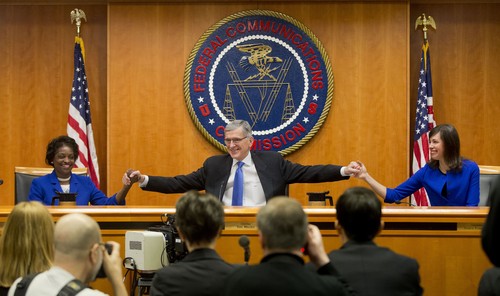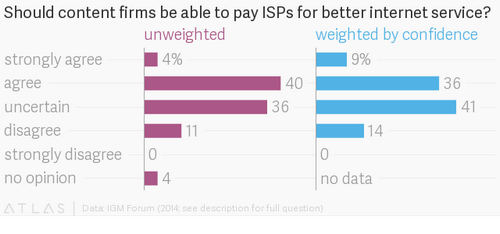The economists, unsurprisingly, were highly suspicious of interfering with the market. Sentiment toward the idea was split, with 40% in support of it (contravening today’s net neutrality regulations) and 36% registering “uncertain.” Only 11% disagreed that content providers should be allowed to prioritize.

When weighted for confidence, those registering uncertainty edged out those in favor.
In 2014, the University of Chicago Booth School of Business assembled 45 distinguished economists across the political spectrum to ask what they thought of a major principle of net neutrality. The gist of the question put to them: Should content companies be able to pay internet service providers for faster, better internet service? (the full question is here 1). Such a policy would create “fast lanes”, or preferred distribution for companies that paid for the privilege, potentially shutting out startups and new competitors who couldn’t afford it.
Those arguing in favor claimed price was critical to an efficient market. “If all qualities sell at the same price, markets cannot allocate quality efficiently”, wrote Stanford economist Darrel Duffie. “Works for soap, wine, and haircuts; why not Internet?”

Well, the internet is not soap. Many customers have limited options, and local monopolies give sellers market power to set prices and curtail investment. Telecoms have also successfully lobbied to prohibit cities from building their own public high-speed internet. Quartz reached out to respondents who strongly agreed with the 2014 statement to see if they had changed their mind since the Obama-era Open Internet Order was enacted in 2015.
One, MIT professor David Autor, said he was now inclined to switch his vote on the matter. “I’m probably in favor of keeping net neutrality regs, even though I do think they are something of a fiction”, he wrote by email, citing the fact that large companies could still pay for infrastructure to deliver faster content, which would blunt the effect of the rules.
“The alternative reality is worse than the present fiction, imho in my humble opinion”, he wrote, while emphasizing he was not a domain expert.
Many of those who originally opposed the idea argued that there simply wasn’t enough competition to ensure the market would function properly in the absence of rules. “Allowing the industry to charge more to content providers may not improve the market”, wrote Princeton economist Janet Currie at the time. That lack of competition is still true today. For home internet, the FCC found that 56 million households in the US lack any choice for the FCC broadband standard of 25 megabytes per second. Many still lack broadband access entirely.


